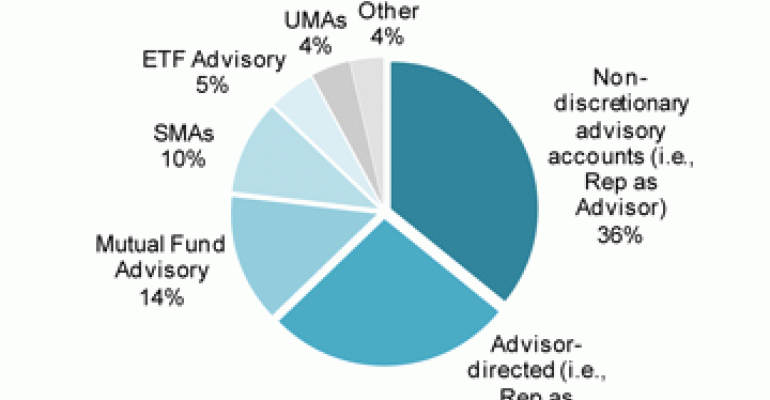Despite the compliance hurdles, more than one third of financial advisors see direct handling of clients’ assets by FAs acting as their portfolio managers clearly outpacing other fee-based management styles in the next three years, according to a new survey by the Aite Group. The survey underlines a growing trend in that part of the fee-based sector referred to as discretionary advisor-directed asset management. In this style, the FA acts as the clients’ “portfolio manager,” personally creating or accessing portfolio models and making investment decisions without consulting the client. That contrasts with FAs who handle clients’ assets on a non-discretionary basis. FAs also act as portfolio managers, picking investments. However, orders are only executed with the client’s permission. (Registered Rep. first wrote about this trend in a story called “Keeping it Under Control” that was part of our annual Top 100 Wirehouse Advisors of America package in the September print issue.)

Among the other “styles” examined in Aite Group’s third annual survey of financial advisors released today, the independent research and consulting firm quantified FAs who offer separately managed accounts, mutual fund advisory, unified management account and ETF advisory. The Aite Group survey, representing an industry cross-section of more than 400 financial advisors in the U.S., reveals that 37 percent of FAs overall said the “rep as portfolio manager” style will gain the most as a percentage of the fee-based assets business in the next three years. Today, some 27 percent of fee-based assets are managed in this way. (Assets under management in the fee-based industry accounts for between 25 percent and 40 percent of the average revenues of advisors at brokerages in the U.S, according to Aite.)
Not surprisingly, the proportion of advisors using this “rep as PM” approach varies across industry segment today, as do their expectations. But there’s no doubt about the upward trend. Among Registered Investment Advisors, some 53 percent today take this approach, with 58 percent expecting to do so in the next three years. By contrast, 22 percent of FAs at wirehouses today use this style. Meanwhile, 38 percent of them expect this style to gain the most in the fee-based channel in the next three years. Meanwhile, among wirehouse brokers, the rep as advisor style will show a gain of 24 percent within the next three years; separately managed accounts channel will gain 14 percent; mutual fund advisory, 12 percent; and finally unified managed accounts will gain by eight percent.
Aite suggests a strong reason for the latest trend. “Rep as Portfolio Manager—the management of client assets by the financial advisor on a discretionary basis—is without a doubt the asset-management style most sought after by financial advisors,” according to the Aite report, titled, Managing Wealth: Advisor Perspectives on Investment Products and Fee Business. “Advisors seem to be dissatisfied with traditional asset-management methods…which give them little influence on the management process.”
The report, authored by Alois Pirker and Sophie Schmitt, added: “Their hands must have felt tied as they were not able to take immediate action when markets showed a great level of volatility, particularly given that they compete with independent RIAs — which are nimble, small firms at which advisors are more often than not the portfolio managers of client assets.”

Still, in an interview with Registered Rep., Schmitt said she was surprised by the results. It contradicts this popular notion of the FA as a sort of generalist who takes a more financial planning approach, surrounded by investment product specialists, she notes. “It goes against the idea that as an FA you can talk about anything to your client, you can manage your client’s financial life but you are not necessarily the deep expert on everything,” Schmitt said. Schmitt said that a move by advisors towards directly handling clients’ assets as their portfolio managers raises compliance and regulatory issues. “The home office is going to have some challenges ahead of it, making sure everything is documented,” she said.
Nevertheless, the Aite report notes that advisors who manage their clients’ assets directly are much better prepared to respond in volatile market conditions. In addition, FAs can better compete with RIAs who today commonly handle client assets directly. (Aite noted that forty-three percent of the surveyed advisors’ revenue is generated by recurring fees today.)
In other highlights from the report, Aite said mutual funds still dominate FAs books’ of business. Across the books of 440 advisors polled, 25 percent of clients’ assets are invested in this instrument. U.S. equities and fixed-income instruments are in second and third place. At the same time, exchange-traded funds have not been able to dislodge mutual funds. Only eight percent of advised client assets are invested in ETFs, according to the survey. Annuities are also gaining some ground, reflecting the needs of baby boomers. The survey showed that advisors expanded their allocation of client assets to annuities to 17 percent from 13 percent in late 2009. The guaranteed income element of annuities was popular with retiring baby boomers, according to Aite.







